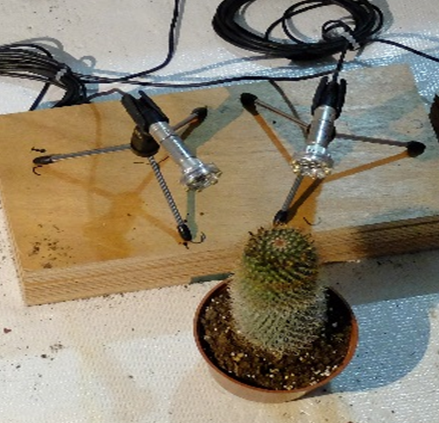Researchers in Israel have found that tomato and tobacco plants that are dealing with stress factors make a popping sound that can be detected over 0.91 m away, a reaction that seems tantamount to a human moaning in anguish or yelling in pain.
Plants were previously known to produce ultrasonic vibrations, but the new work reveals that the sounds produced by at least two plants are airborne. The team’s work is published in Cell.
“We know that there’s a lot of ultrasound out there — every time you use a microphone, you find that a lot of stuff produces sounds that we humans cannot hear — but the fact that plants are making these sounds opens a whole new avenue of opportunities for communication, eavesdropping, and exploitation of these sounds,” said Yossi Yovel, a neuro-ecologist at Tel Aviv University and a co-author of the paper, in a Cell journal release.
The researchers recorded tomato and tobacco plants in a soundproofed chamber and in an ordinary greenhouse. They harassed the plants by not watering them for a few days and by stem cutting; both approaches elicited pop- or click-like sounds from the plants. (Unstressed plants also emitted sounds, but far fewer; the stressed plants emitted between 30 and 50 clicks per hour.)
The team thinks the sounds may be caused by air bubbles in the plants’ vascular systems. It’s not clear whether the sounds serve any purpose, such as an attempt to communicate with other organisms. You can check out the sound yourself here.

The pop sounds are beyond human ear frequencies but fall within the realm that other mammals, insects, and perhaps other plants could pick them up.
“It’s possible that other organisms could have evolved to hear and respond to these sounds,” said Lilach Hadany, an evolutionary biologist at Tel Aviv University and co-author of the paper, in the same release. “For example, a moth that intends to lay eggs on a plant or an animal that intends to eat a plant could use the sounds to help guide their decision.”
Besides tomato and tobacco plants, the team found that corn, wheat, grape, and cactus plants were found to make sounds, but they didn’t study the behaviour of those species as intensively.
The jury’s still out on plant intelligence, but some experts do think that plants are conscious in their own way. Plenty more work will need to be done to understand the exact nature of these sounds — could they really be a cry of pain, or are they just a meaningless evolutionary quirk? — but the study is certainly an intriguing addition to our knowledge of how plants function.
